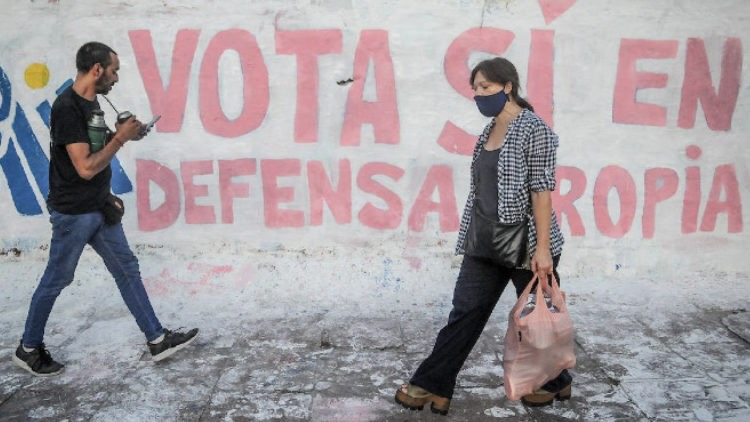On March 27, around 2.3 million Uruguayans participated in the referendum to decide whether or not they want to repeal the controversial 135 of the 476 articles of the right-wing government’s omnibus law, called the Law of Urgent Consideration (LUC). In the early hours of March 28, the Electoral Court (CE) reported that Uruguayans voted to uphold the law as the option “No” won the referendum by less than 1% of the votes.
According to the results published by the CE, with 100% of the votes counted, the option “No” received 1,087,557 or 47.3% of the votes, while the “Yes” option obtained 1,065,001 or 46.3% of the votes. The “No” option surpassed the “Yes” option by only 22,556 or 0.98% of the votes.
Conservative President Luis Lacalle Pou, in a press conference on Sunday night, looking at the trends, assured that the law would be maintained and that the “yes” option would not reach the necessary votes for the annulment of the articles. “It is a stage passed, the law is firm,” said Lacalle Pou, adding that his administration would hold a series of meetings in the coming days to discuss changes in the pension system, trade deals and prices of different products.
Meanwhile, the National Commission for Yes, which brings together several social organizations, trade unions such as the Inter-Union Plenary of Workers – National Convention of Workers (PIT-CNT) and the left-wing opposition parties such as the Broad Front (Frente Amplio), the Uruguayan Communist Party, among others, also issued a statement, recognized the results and hailed the celebration of the democratic process. “According to the primary official information from the Electoral Court, 50% of the valid votes required to annul the 135 articles of the LUC have not been exceeded, despite having achieved a very important expression of the citizens, which has allowed us to be very close to achieving our objective. It was a fundamental democratic day that strengthens us as a country and makes us proud as Uruguayans,” read the statement.
Este referéndum fue resultado de un largo proceso, en el que demostramos una vez más que la democracia es el camino, y que tenemos mucho para decir.
🇺🇾Gracias a todos los uruguayos y uruguayas que hicieron posible esta hazaña. pic.twitter.com/MyR55Bt9kt— Vota SI (@VotaSiUy) March 28, 2022
The Law of Urgent Consideration
The Law of Urgent Consideration (LUC) was the top most priority of the Lacalle Pou government. During his election campaign, Lacalle Pou promised to make legal changes in all aspects of Uruguayan social life: health, education, housing, employment, economy, public security, pension system, among other areas. Soon after taking office in March 2020, Lacalle Pou bundled all the reforms into an omnibus bill with 476 articles, classified it as urgent, and requested a vote in congress within 90 days. With the ruling coalition having the majority in both houses of the Parliament, the bill quickly passed.
Nevertheless, it was widely rejected by the country’s opposition parties, trade unions, social organizations and popular movements, which deemed it as a package of anti-worker, pro-corporate, neoliberal and regressive reforms. The sectors condemned that the legislation promoted budget cuts in the public sector, supported the privatization of public companies, eliminated the compulsory nature of initial education, limited the participation of teachers in educational decisions, restricted the right to strike of the workers, restricted the use of public space for protests, increased prison penalties for various crimes, increased the powers of law enforcement forces, enshrined impunity for police and military officials who kill in self-defense, enabled express evictions of people who rent without guarantee, increased the limit of cash transactions, among other aspects.
Following its approval in July 2020, sectors of the Frente Amplio and the PIT-CNT proposed collecting signatures to hold a referendum to repeal the contentious articles of the LUC. In the following months, various social and political actors began campaigning against the legislation and successfully collected 800,000 signatures, more than the 25% of the total number of registered voters constitutionally required to file a referendum appeal against a law. In July 2021, the signatures were delivered to the Electoral Court, and in December 2021, the electoral authority completed the process of verification and validation of the signatures and called for the plebiscite.





